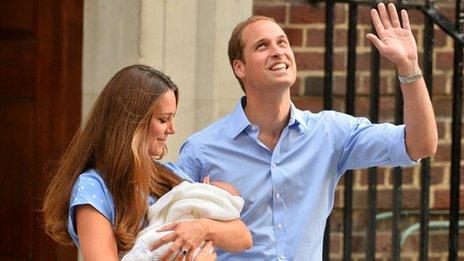Are the school odds stacked against summer babies?
- Published

Here comes the son: But does a summer baby face an uphill struggle at school
The royal baby might have been born into a life of many advantages, but in terms of educational success there is one factor that could work against him.
Being born in July.
Summer babies face the so-called "birth-date effect", which means that children born in June, July and August are statistically likely to perform less well than their older classmates.
Summertime might be when the living is easy, but learning is more problematic.
This gap is still measurable all the way through primary and secondary school, GCSEs, A-levels and university admissions. There is no point at which these sunshine-month youngsters ever catch up with their older winterish peers.
A few years ago, Cambridge Assessment (an exam board rather than a namesake of the new baby) carried out a major overview and concluded that summer babies were "strongly disadvantaged" and that evidence of this age-related gap "stared out of qualifications data".
By the end of primary school the difference on average is 12%, a substantial difference in the data-obsessed measurement of primary school performance.
An analysis of more than half a million GCSE candidates found a consistent pattern of summer-birthday teenagers performing less well across all subjects.
A Freedom of Information request this year showed that the chance of going to Oxford or Cambridge was 30% higher for someone born in the autumn rather than July.
The difference is so stark that the Institute for Fiscal Studies (IFS) said that summer-born children should get extra exam marks.
Mind the gap
But why should there be such a persistent difference?
The IFS suggested that it could be about a lack of confidence and they linked this to younger children being more likely to be unhappy at school.
The number crunchers at the IFS also said this had economic consequences for individuals.
Summer-born children are more likely to take vocational rather than academic courses and are less likely to go to a high-status university - and as such are likely to earn less than older children in their year group.
Another suggestion from Cambridge Assessment is that summer-born children are simply less mature "cognitively, socially and emotionally". Children begin school at a disadvantage and then never quite catch up, with lower achievement at the start of school shaping their expectations in the years ahead.
It's not all bad omens for the young Prince George's chances of getting a few decent GCSEs. The likelihood of educational success is like a Rubik's cube with many faces.
If a summer birth is a downward factor, then his location of birth couldn't be more auspicious. Being a Londoner is currently a very good thing from an educational perspective. The capital's schools have become the strongest performers in England.
Figures published on Tuesday by the Ucas university admissions service showed that teenagers in London were much more likely to apply to go to university than those anywhere else in England.
Family background and parental wealth remain very important factors in predicting academic achievement - and the modest advantages of Prince George's family should be in his favour.
It's been claimed that counting books in a home is a good indicator for children's learning, but for the young prince it could be a case of counting libraries.
But there are other negative factors. Being born a boy now means an immediate downgrade on educational prospects. There has been a global phenomenon of girls overtaking boys at every educational level.
Whether this will affect the young royal's future job plans might be debatable.
- Published10 May 2013
- Published27 February 2013